It’s been widely noted, in the hours since the New York Times published its explosive story about alleged pre-election contact between Trump advisers/associates and Russian intelligence operatives, that the piece seemingly contradicts another major Times story published on Oct. 31. That October article, printed amid the furor over FBI Director James Comey’s announcement of a new lead in the Hillary Clinton email investigation (which ultimately amounted to nothing), was titled “Investigating Donald Trump, F.B.I. Sees No Clear Link to Russia.” Isn’t it a little odd that now, in a piece called “Trump Campaign Aides Had Repeated Contacts With Russian Intelligence,” the Times says the FBI is “sifting through” a collection of “call logs and intercepted communications,” which show that “members of Donald J. Trump’s 2016 presidential campaign and other Trump associates had repeated contacts with senior Russian intelligence officials in the year before the election”?
Well, yes. But the two stories aren’t quite as distinct as it might seem. Let’s look at the specific language in the October piece, written by Eric Lichtblau and Steven Lee Myers, used to describe what the FBI was looking for and had found.
- “Intelligence officials have said in interviews over the last six weeks that apparent connections between some of Mr. Trump’s aides and Moscow originally compelled them to open a broad investigation into possible links between the Russian government and the Republican presidential candidate.”
- “Law enforcement officials say that none of the investigations so far have found any conclusive or direct link between Mr. Trump and the Russian government.”
- “Mr. Trump himself has not become a target. And no evidence has emerged that would link him or anyone else in his business or political circle directly to Russia’s election operations.”
Now let’s look at some key lines in Tuesday’s story, which is credited to Michael S. Schmidt, Mark Mazzetti, and Matt Apuzzo. (I mention the writers’ names because it’s conceivable that different teams of investigative reporters have different sources who might have differing opinions about the meaning of a given collection of evidence.)
- “Phone records and intercepted calls show that members of Donald J. Trump’s 2016 presidential campaign and other Trump associates had repeated contacts with senior Russian intelligence officials in the year before the election.”
- “The intelligence agencies … sought to learn whether the Trump campaign was colluding with the Russians on the hacking or other efforts to influence the election. The officials interviewed in recent weeks said that, so far, they had seen no evidence of such cooperation.”
- “The officials would not disclose many details, including what was discussed on the calls, the identity of the Russian intelligence officials who participated, and how many of Mr. Trump’s advisers were talking to the Russians. It is also unclear whether the conversations had anything to do with Mr. Trump himself.”
- “The National Security Agency, which monitors the communications of foreign intelligence services, initially captured the calls between Mr. Trump’s associates and the Russians as part of routine foreign surveillance. After that, the F.B.I. asked the N.S.A. to collect as much information as possible about the Russian operatives on the phone calls, and to search through troves of previous intercepted communications that had not been analyzed.”
The new story adds one critical piece of information: The NSA allegedly has evidence of a number of specific conversations between Trump associates and Russian intelligence officials. Besides that, the February and October stories actually match up pretty well. Neither says that Trump himself has had contact with Russian operatives, and neither says that there’s evidence that Trump associates were aware of any Russian intelligence plans to influence the U.S. election. It certainly seems suspicious that Trump’s advisers would be in contact with Russian spooks, but the new piece makes clear that the Times has no evidence as of yet that those contacts constituted illegal or otherwise inappropriate coordination. Again, in October, “law enforcement officials [said] that none of the investigations so far have found any conclusive or direct link between Mr. Trump and the Russian government,” and Tuesday’s story says the same, emphasis on direct.
Note also the Times never claimed in October that phone calls between Trump aides and Russian figures hadn’t happened; it merely reported that “apparent connections between some of Mr. Trump’s aides and Moscow” existed and were being investigated. It’s plausible that the Times used that language at the time because its sources simply hadn’t described what those “apparent connections” were. If that’s true, it’s certainly fair to ask what those sources’ motives were—was the Times being spun in October by a pro-Trump faction in the FBI? The newspaper may also have gone overboard by putting a headline on the October piece—“Investigating Donald Trump, FBI Sees No Clear Link to Russia”—that was too definitive given that said link was still being investigated. But once you get past the headlines, what the two pieces both describe is a murky situation that only got slightly less murky Tuesday, not a sudden reversal on the part of investigators and/or the Times.
